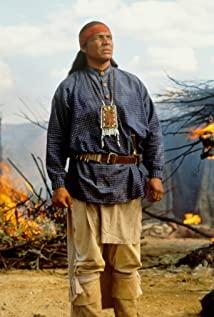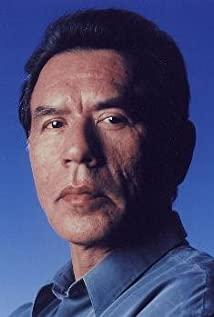- the wild thoughts and discussions of
"Dances with Wolves" caused by Thanksgiving Actually, "Dances with Wolves" is not as literal as it thinks, and "Dances with Wolves" really has nothing to do with wolves; , For "Dancing With Wolves", I can only evaluate it as a very good-looking feature film with strong readability, and there is nothing deep enough to say. It meets the requisites of a classic Hollywood blockbuster: a twisty plot, a romantic legend, a beautiful picture and a beautiful melody. Its commercial operation was successful, and Kevin Skotner became an overnight success.
Regarding the theme of the west, from "Ambition of the Earth", to "The Years of Love", and then to "Dancing with Wolves", although the handsome guy who performed it changed from Tom to Xiaobu, and finally to Kevin Scott Accept, but the desolate beauty, the majestic beauty, the open beauty is eternal.
The most primitive masculine charm full of wildness radiates to the surrounding without concealment, and also stimulates the most direct desire for conquest in people's hearts. The previous films were all from the point of view of pioneers, showing how tenacious and tenacious to start their own business in a foreign land, so my impression has always been to classify the Indians as savages who drank their blood and blood, and did not release them at all. In the eyes, although they are the real original owners of this land. However, "Dancing With Wolves" has a large positive description of the Indians, which is also considered a major innovation.
I didn't intend to write this review, which is not a film review, but I suddenly realized that today is Thanksgiving. It is said that the original Thanksgiving Day was established to commemorate the selfless assistance provided by the Indians to the first batch of foreign immigrants on the Mayflower. I can't figure out how these grateful outsiders can finally drive the people who warmly entertained them to the point of slaughter. It's a bit like a copy of the farmer and the snake in Aesop's fables. Indians again. Coupled with the fact that I stumbled across the original soundtrack again, there are indications that if I don't write something, I'm going to have a hard time with myself. Just write something to commemorate this festival with an ancient tradition.
As the dialectics of philosophy says, accidental events always contain inevitability or reflect the general trend of the development of things from a certain angle.
Some things are inevitable. When the male protagonist exchanged his armor with the Indian in his military uniform, I knew that he would definitely integrate into this new group in the near future, just as something would happen if he left the army and went back to look for the diary.
Many times, things that seem to be orderly become chaotic at one point, or even completely subverted, and we do not know where the turning point that changes the direction of events is. Who reversed the gears of fate? In fact, no matter who it is, when things develop to a certain stage, someone will always break this balance. For example, no matter how many white people come, there will be a large number of white people invading and occupying the territory of the Sioux. For example, even if the hero does not Going back to the camp to get the diary is bound to be the same as encountering white people somewhere else. Qualitative change is different from quantitative change, otherwise the story will not be able to develop and history will not be able to move forward. When the tipping point is destroyed, the event will act like a catalyst, accelerating the entire process, whether in a favorable or detrimental direction, and sometimes even out of control. Just like the last "Dances with Wolves" to leave is not controlled by his own will, the same as a last resort.
In the film, Lieutenant Dunbar, the hero who made great achievements in the Civil War, was finally willing to take off his military uniform and lowered the flag that was planted on his horse all day. He was charged with betraying the United States of America and joined the Indian tribe. Surprising.
The fusion of the products of modern civilization into primitive civilization seems inconceivable, and it even makes people feel that this is a cultural regression.
But when you think about it, what's there to accuse him of? As a lonely person living in the western wasteland, as an individual, when not affected by the group consciousness, human nature will return to the most primitive nature. He longed for communication, and all he sought was a new way of life that was natural and peaceful. So when he found out that the ferocious and brutal Indian tribe in the legend is actually so simple, sincere and kind, and people live in harmony with each other, what reason is there not to be attracted by it? Even if you give up a life of comfort and pleasure, even if you give up fame and fortune, it is understandable. As "Kick the Bird" said to Dunbar: It's all doomed, it's your destiny, and I knew early on that you'd join us eventually. It has a taste of ancient Chinese traditional fatalism. Aren't more and more naturalists now advocating this kind of life?
The Indians have their own civilization and are a simple and warm nation. Having their own way of dealing with friendship and aggression, they treat their friends with simplicity, kindness and friendliness. In this rural society, clansmen can trust and rely on each other and fight together to defend their homeland. Indians like to stick to the ground when in action. Get close to the ground, get as close to it as you can with your naked body, use your own skin to get close to his skin, and feel the pulse of enormous energy galloping under its skin. Just like the Titans in mythology, only by being close to Gaia, the mother of the earth, can you draw endless power. Perhaps it is because the indigenous people here awakened the consciousness of the protagonist very early and became closer to nature.
They treat the land and its creatures with a maternal sentiment. That kind of feeling is like the gratitude of Chinese farmers for their land, so they also hunt buffalo, but they will never leave their corpses in the wilderness "without a soul". What they pursue is a harmonious relationship between man and man, man and nature, just like the name of a record: well balanced.
In contrast, the so-called modern civilization, which we are proud of and nurtured by, is so violent and bloody. Those white aliens, treating the colonies as their appendages, went wild and plundered for gold and treasures, venting their possessive desires. There is also a naked financial relationship between people, mutual suspicion and distrust, they torture prisoners, slaughter water buffalo, and even shoot innocent lives for fun, without any mercy. The Indians still believe that human nature is inherently good, so everyone can be a leader, and the tribe advocates the rule of virtue and democracy; but we have to believe that the selfishness and greed in human nature must be overcome by law, so the rule of law is better than the rule of man. Is this progress or regression?
Therefore, in fact, it is the materialistic society that is advertised as the representative of the most advanced culture that is actually going backwards. It is a great irony. Of course, I'm not talking about the regression in material living standards, but the level of spiritual civilization. As far as living conditions are concerned, we have too many reasons to be proud of the unprecedented prosperity of the scientific and technological level of human society.
However, do nations with advanced productive forces qualify for cultural superiority? Are their moral standards necessarily better than those of the savage natives? But in fact, it's not.
It is true that in most cases, it is the material foundation that determines the superstructure, but the large-scale lack of spiritual civilization in today's society, the sharp decline or even the decline of the moral level is also a reality that we cannot escape. There is no doubt that our technology is advancing in great strides, and our moral level is also retreating in great strides. I think we must first have the courage to face the chronic disease, and secondly we must have the courage to change it.
I was amazed for a long time. How does communism, the ultimate goal of human society, differ from primitive society in its organizational form? Has human civilization returned to the starting point after walking a circle? For this somewhat hopeless question, I have now recited the answer: the history of human beings spirals upward in twists and turns, so the seemingly overlapping starting and ending points are actually not on the same level. Primitive society is compelled to cooperate and share, while communist society is realized by self-consciousness. True. I hope so, but we're really far from that goal right now.
Back to the original. Can a nation with a high standard of living absolutely discriminate against a civilization whose material level is less developed? Just like this movie is just a beautiful legend, the struggle between nations should be abandoned, and the ideal of peaceful coexistence is just a utopian idea. Although this ideal is free and beautiful, people have never put down the guns in their hands.
This is, after all, an era of military competition. In a society where the strong eat the weak, the powerful party always holds the power to kill the weaker party. So even if the Sioux are willing to protect and nurture their land with their lives, even if they are not warlike, even if they are not threatening, they have to surrender absolute control over the territory in the end. Different ways of living cannot make peaceful coexistence. You do not offend people, but people will offend you. Fraternity, equality and peace are just smoke bombs from the mouths of politicians. Under the stimulation of hormones, what is transmitted on the grassland is the breath of aggression and expansion.
The so-called national integration and mass expulsion are actually killings under the guise. In Chinese history, there has never been a shortage of such "great unification", whether it is the Han nationality against the barbarians, or the Qing army entering the customs. In the end, is this narrow-minded ethnic thinking at work? This is a too complicated sociological question. In the long run, this kind of identity discrimination not only led to the bloody slaughter of Indians, but was even the direct source of the inhumane genocide policy of national expansion in World War II. Even today, racial discrimination still exists widely; Isn't the contradiction of discrimination against migrant workers also rooted in this racial superiority theory? How many people's hearts are cold by the word "peasant workers"?
As a result, Indian civilization was violently conquered, and the glorious Western civilization continued to expand rapidly, in this era of accelerated extinction of various species and civilizations. So the surviving Indians cut their long hair and put on denim, and suddenly the uncivilized race entered a new age. If you don't adapt, you can't survive. I wonder if those ancient national identities have disappeared, and whether these scenes can only be seen on the screen. Although now the United States has begun to advocate cultural differences, advocate the protection of the life circle of the Eskimos, and try not to let their way of life be destroyed by modern civilization, as well as rebuild the cultural revival of the Indians, but like a broken porcelain bottle, it is like a broken porcelain bottle. Disrupted cultures are difficult to restore.
Actually, this is not the case in China. When one culture has absolute dominance and dominance, other cultures must be subservient. For a long time, we have not learned to stand on an equal footing and tolerate each other on the basis of respect. True national integration should be inclusive of various civilizations, not integration. Assimilation is a very scary word. Compared with material aggression, ideological rape and cultural plunder are the most terrifying. Without our own culture, we have no roots at all. China's civilization for thousands of years has not been enslaved by foreign races, and there has been no cultural rupture. This is gratifying. However, in the peaceful era, the hidden worries of peaceful evolution have not diminished. This also deserves our attention and vigilance.
This reminds me of the popular "Kekexili", a Chinese western movie. According to the director's own words, the film essentially goes deep into the hearts of Tibetans to study their survival activities and struggles. In fact, they are very similar to the Indians, living in remote poverty and extreme hardships, but because of their beliefs, their lives and hearts are peaceful and peaceful. The Tibetan people are, in their own minds, a nation without borders, a wandering nation, and a nation that is losing its mother tongue. Their protection of Hoh Xil and Tibetan antelopes is actually their love and care for their last homeland. Let's hope they stick to their dreams and don't start to decline before they are violently conquered, repeating the tragic mistakes of Indian or Jewish genocide.
Bernard Shaw said that the meaning of life is not to find oneself but to create oneself. If so.
04.11.26
View more about Dances with Wolves reviews











